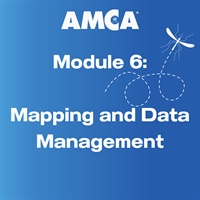Module 6 Mapping and Data Management
- Average Rating:
- Not yet rated
- Categories:
- Integrated Mosquito Management
- Faculty:
- Daniel Markowski, Ph. D. | Christopher Barker, Ph. D.
- Course Levels:
- All Levels
- Duration:
- 22 minutes
- Format:
- Audio and Video
- License:
- Never Expires.
Description
Welcome to Module 6 Mapping and Data Management of the AMCA Best Practices for Integrated Mosquito Management Virtual Training Program. This training program will provide you with the knowledge needed to understand and conduct Integrated Mosquito Management (IMM); including topics such as mosquito biology and the five main components of IMM: community engagement, collecting and using data, reducing potential larval habitat, using all control methods available and reasonable, and regularly evaluating the efficacy of the program.
Specifically, this module will cover:
- Different types of data collected in a mosquito control program
- The impact and uses of visualizing data
- Geospatial data and geographic information systems (GIS)
- Different software and ways to access GIS
- Analyzing data and predictive capabilities
If you are interested in completing the AMCA Best Practices for Integrated Mosquito Management Virtual Training Program Certificate, you MUST do this module within the overall program. If you have not come to this page from the program please subscribe to the program prior to beginning this module, please click here to begin.
Recommended reading for this module:
- Pages 49-53 in "Best Practices for Integrated Mosquito Management" found at https://www.mosquito.org/assets/pdf/hr_november_2021_amca_bmp_ma/
Additional Resources
- Esri. 2023. ArcGIS. https://www.arcgis.com/index.html
- QGIS. 2023. QGIS. https://www.qgis.org/en/site/
- Google. 2023. Google Earth. https://earth.google.com
- The R Foundation. 2023. R. https://www.r-project.org/
- PostGIS PSC & OSGeo. 2023. PostGIS. https://postgis.net/
- GRASS Development Team. 2023. GRASSGIS. https://grass.osgeo.org/
- Vectorborne Disease Surveillance. 2023. VectorSurv Maps. https://maps.vectorsurv.org/
Handouts
Additional Resources
|
|||
Faculty
Daniel Markowski, Ph. D. Related Seminars and Products
Technical Advisor
American Mosquito Control Association
Dr. Daniel Markowski has served on the front lines of the nation’s various mosquito-borne disease outbreaks from West Nile virus to Zika virus and worked with various local agencies to quell the outbreaks. He has also coordinated aerial responses to every major hurricane event in the US since 2004. In the spring of 2022, he accepted a position as the Technical Advisor for the American Mosquito Control Association (AMCA). In this capacity, Markowski represents the Association’s members on all operational, technical, legislative, and regulatory matters related to the vector surveillance and control industry.
Christopher Barker, Ph. D. Related Seminars and Products
Dr. Chris Barker is a professor of epidemiology in the Department of Pathology, Microbiology, and Immunology in the School of Veterinary Medicine at UC Davis. He directs the Pacific Southwest Center of Excellence in Vector-Borne Diseases and VectorSurv, which is a data management platform that serves vector control and public health agencies in the U.S. His research focuses on the epidemiology of arboviruses, with particular interest in risk estimation and prediction to guide mosquito control and inform public-health policy.
